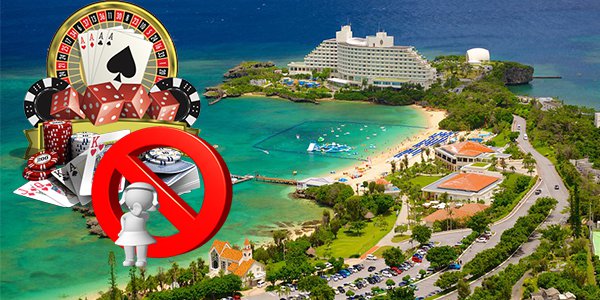Okinawa Abandons Casino Interests
Posted: January 29, 2015
Updated: October 6, 2017

Okinawa prefecture aborts plans for a casino amidst a bill being resubmitted into the Diet this week that will legalize casino gambling in Japan.
The island of Okinawa, the southernmost prefecture in Japan, has opted not to try to attract casino operators. For the past eight years, the prefectural government has provided funding for research study on integrating resorts which was allocated in their budget. The Japanese newspaper Yomiuri Shimbun has reported that such funds for research were not included in the Okinawa’s most recent fiscal 2015 budget.
• Okinawan Prefecture opts not to have casinos.
• Japan will resubmit bill in Diet session this week.
• Osaka and Tokyo casinos unlikely before 2020.
• Las Vegas Sands pledges $10 billion on Japanese casino.
The prefecture government of Okinawa first began their research into the casino resort industry in 2007. Through that time until now, the government allocated $724,801 in order to create a workable blueprint for a casino. The research showed that launching an integrated resort in the suburbs would result in excellent financial benefits that would result in the neighborhood of $1.86 billion while creating employment for 54,000 people.
Hakuhodo Inc, a Japanese advertising and public relations agency, presented in their results that the Okinawan prefecture, normally a hot summertime spot for Japanese and international travelers, came in second for the most popular location for a casino in Japan. I’m sure Hakuhodo as well as many other companies specializing in advertising and public relations would have a field day luring visitors of all sorts in Japan as well as throughout Asia to Okinawa’s newest resort.
The only resistance from this proposal seems to be Okinawan Governor Takeshi Onaga who has been an opponent of the bill since he took office in December. Shinzo Abe, Japan’s Prime Minister, is a strong advocate of the bill seeking early passage of the bill in hopes that legalizing casinos would stimulate Japan’s economic growth. Kazuaki Sasaki, assistant professor at Nihon University College of Economics said that “His (Abe’s) re-election in December reignited hope that the bill might be approved perhaps late next year.
Japan to Resubmit Casino Bill
During the next Japanese Diet session this week, the bill that would legally allow casinos, according to Japanese gambling laws, will be resubmitted. Although the bill was previously submitted in 2013, a failure from lawmakers who missed the November 30 deadline caused the vote to be held back until 2015. Much like the U.S, Japan is still recuperating from the last economic recession.

Since Prime Minister Abe’s Liberal Democratic Party won the election last December, its position in office will offer some degree of hope for the bill to pass. Abe, who a staunch advocate of the bill, would like to see casino operations launched prior to the 2020 Summer Olympic Games in Tokyo. Unfortunately, due to a lack of adequate political backing among Diet member, the vote couldn’t be made by the end of 2014.
Even though casino operators such as the Las Vegas Sand and MGM Resorts International have waged their support, full support for the bill in the Diet is a bit shaky. Komeito, Abe’s junior coalition party is opposed to the bill. This is due to their growing desire to decrease Japan’s continued threat of the promoting a gambling lifestyle. Anti- casino lawmakers who are opposed to the bill point to Japanese addiction to pachinko.
Pachinko is a game that combines a slot machine and pinball. Players go inside pachinko parlors and purchase a number of small, steel balls to play with which are often contained in a small bucket. Players insert the balls in the machine and control the speed at which they fall into holes. If the balls fall into special holes, a slot machine mode is activated where players can win more balls by matching pictures. Although gambling is illegal in Japan, players can exchange balls for prizes in the parlor then exchange the prizes for cash in shops outside the parlors.
New Report Sheds Doubt for Casinos Hitting Osaka and Tokyo by 2020
The Boutique research firm Union Gaming Group LLC put out in a recent report that casino resorts “will never happen in Tokyo and Osaka by 2020.” Christopher Jones and John Decree, co-authors of the report also said that they were “less convinced that the opening of casinos in Tokyo and Osaka would be the right move out of the gate, as those markets do not fit the original reasoning behind the push to legalize casinos in Japan-to spur economic development by encouraging tourism in under-visited regions in Japan.”

The researcher’s logic brought out further explanation concerning the volume of tourists already present in the larger cities versus the areas Japan would like to see more visited. “Today, Japan has no shortage of domestic or international tourists to Tokyo or Osaka. Commonly referred to as the ‘Golden Route,’ the route between the cities is taken by more than 90 percent of all tourists in Japan.”
As we have seen in Japanese gambling news, the legislation for casinos in Japan is farther than it has ever been. Although Jones and Decree agree, they feel that political and economic setting is “as good as it ever will get in Japan” because of the country’s unstable government. The reports suggest that legalization wouldn’t occur until 2015 and “when it does, the decision on where to locate casino resorts might already have been taken.”
The Casino Operator Las Vegas Sands Corp pledged $10 billion on a casino resort in Japan. This would be the largest expenditure on a gaming project in history. The research report mentioned that “early in the process, Las Vegas Sands appeared to have a strong preference to operate independently. It appears to us that a local partner would be a requirement at this point for any developer expecting to win a casino license in Japan. Not surprisingly, Las Vegas Sands has recently softened its tone regarding its willingness to take on a Japanese partner.”
















